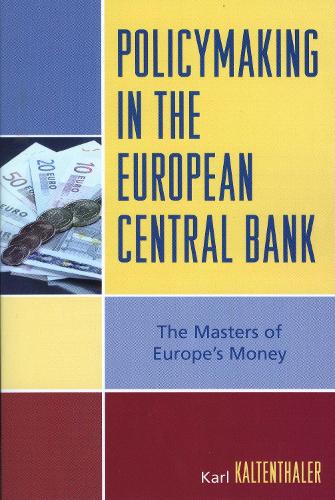
Policymaking in the European Central Bank: The Masters of Europe's Money
(Paperback)
Publishing Details
Policymaking in the European Central Bank: The Masters of Europe's Money
By (Author) Karl Kaltenthaler
Bloomsbury Publishing PLC
Rowman & Littlefield Publishers
17th August 2006
United States
Classifications
Tertiary Education
Non Fiction
Political economy
332.11094
Physical Properties
Paperback
204
Width 152mm, Height 229mm, Spine 13mm
313g
Description
Drawing on numerous interviews with high-ranking and founding members of the European Central Bank (ECB), Karl Kaltenthaler identifies and explains the factors that shape the bank's domestic and international monetary strategies. As at all institutions, politics are very much involved in policy-making at the ECB. Kaltenthaler finds that instead of being unconcerned with how the bank's policies impact the citizens of the Eurozone, the central bankers desire to keep the economy healthy. This desire is driven by the central bankers' two primary personal preferences: to appear competent to as much of society as possible and to maintain broad political support for their operational independence. The policy-making model that offers the best roadmap to a healthy economy is that of the German Bundesbank. To secure the long-term needs of the economy, the decisionmakers in the ECB have created a model that attempts to replicate the Bundesbank's success at the European level and to lend credibility to their own policies. Offering unprecedented access to the internal decisionmaking at the ECB, Policymaking in the European Central Bank will interest readers who want to understand this important European institution.
Reviews
Policymaking in the European Central Bank makes an important contribution to the literature on European monetary cooperation. In contrast to the prevailing literatures emphasis on the institutional structure of the European Central Bank, Karl Kaltenthaler skillfully examines the factors that explain the policy choices of independent central bankers. Based on public choice theory, he presents a compelling explanation for the decision by Europes central bankers to largely emulate the policy strategy of Germanys central bank, the Bundesbank. This book is essential reading for those interested in the European Union and monetary policymaking more generally. -- Matthias Kaelberer, University of Memphis
Karl Kaltenthaler provides a detailed account of the origins, structure, and functions of the European Central Bank. His study, based on extensive interviews and other evidence, focuses on how the goals and principles that motivate European central bankers affect their approach to monetary policy. Policymaking in the European Central Bank is an in-depth exploration of one of the world's most important economic institutions. It will be useful and interesting to anyone concerned with understanding contemporary trends in monetary policy or in European integration. -- Jeffry A. Frieden, Harvard University
The European Central Bank is an immensely powerful but very new institution. Karl Kaltenthaler's [book] is insightful, accessible, and the best treatment yet of what the European Central Bank is and why it follows the policies it does. Kaltenthaler reveals that central bankers, rather than functioning like remote and unaccountable bureaucrats, are political actors who care about economic outcomes but also about what people think of them. -- Christopher J. Anderson, Cornell University
Author Bio
Karl Kaltenthaler is faculty fellow in the Bliss Institute for Applied Politics at the University of Akron. He also teaches in the Department of Political Science at Case Western Reserve University.
